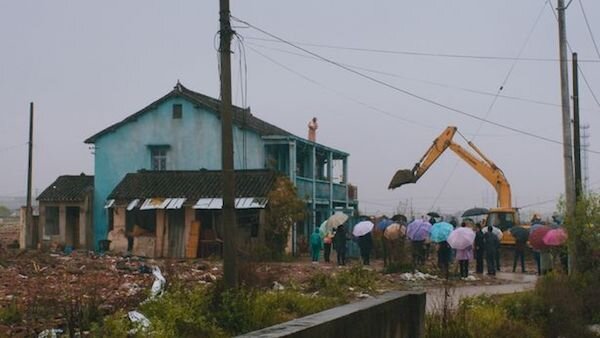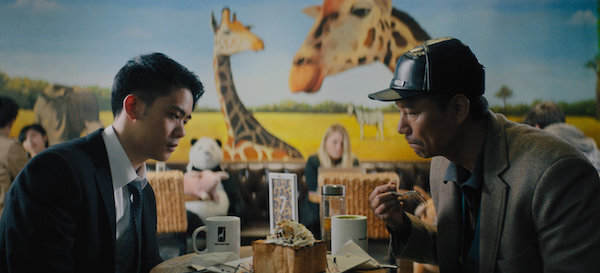Before she became the first Asian woman to direct a major superhero movie, Cathy Yan released a boldly candid debut feature examining our perennial quest to find, or preserve, our place in a rapidly modernising world. Rach Leong reflects on the repercussions of urbanisation and the meaning of “home” in the film, now streaming on MUBI.
There is an image in Dead Pigs that haunts me: a single turquoise house, the only roof left standing amidst vast acres of concrete rubble, demolished remnants of a community that once was. If time has taught us anything, it is that in the race towards modernisation, someone always gets left behind.
Candy Wang, owner of the turquoise house and endless leopard-print garments, knows this all too well. During the day, she runs a beauty salon filled with adoring customers; behind the scenes, she fights tooth and nail to save her childhood home from being uprooted by private property developers intending to build a gaudy rip-off of Barcelona’s Sagrada Família. A big believer in manifestation, Candy has her employees line up in military-style rows to chant positive affirmations like “I am unique! I will succeed!”, the same way she furiously declares to the property developers: “I was born here, raised here and I will die here!”. But speaking into the universe feels a bit like shouting into the void, against the tangible allure of cold hard cash. In contrast to the way Candy clings onto tradition, her brother Old Wang — a pig farmer with a virtual reality obsession — does not harbour the same nostalgic sentiments. The VR set that he purchases on a whim becomes an escape from his financially-troubled reality, where his livestock have mysteriously dropped dead and he has been swindled out of his savings by an investment scam. Finding himself in serious debt to local thugs, Old Wang cannot comprehend why Candy would refuse to give up their weathered house for a monetary settlement.
Cathy Yan’s ambitious debut feature weaves the siblings’ plight together with three other intersecting narratives: Old Wang’s quietly stoic son Wang Zhen who works as a waiter in the city but lets his father think he is a high-flying businessman; Xia Xia, the spoiled rich girl he falls for; and American expat Sean who tries to brush off past failures by building his architect career in Shanghai despite questionable credentials. Comparisons to Paul Thomas Anderson’s Magnolia are inevitable given the multi-strand narrative, the plotline incorporating a sudden deluge of animals and the spontaneous musical number. While both films study the intricacies of familial relationships and the consequences of selfish human behaviour, Yan holds her own by treating each character with empathy, exploring the motivations and circumstances that drive them apart and bring them back together. Would you sell out your sister for a cheque if you needed it urgently enough? Pretend to be someone you’re not if it would make your parents proud? Pay off someone you’ve wronged in order to redeem your conscience?
Yan sharply portrays the transactional nature of human interaction in a society where you can put a price on anything. To help pay off his father’s debt, Wang Zhen resorts to “crash for cash” fraud, deliberately throwing himself at vehicles to feign injury and extort compensation. When Xia Xia gets into an accident, she is sent expensive gifts by her fair-weather friends, though none of them bother to visit her at the hospital, forcing her to realise the hollowness of her material possessions. Sean meets Candy on behalf of the developers to negotiate, but when she opens up about what the house means to her family, his only thought is that her brother may have rights to the deed and that they could persuade him instead. The phrase “how much do you want?” is repeated frequently, further driving the message. For those who have money, it is a get-out-of-jail-free card. Those who don’t must find increasingly desperate means to survive. And for those in between, who have a little but not enough, life is a constant chase to get more, a never-ending climb up the social ladder.
A subplot involving a Zazie Beetz cameo sees Sean taking on a side-gig at media events for Chinese companies that just want an English-speaking Western man for publicity, thus allowing his whiteness to be commodified. This is frequently funny (while impersonating an American CEO announcing a partnership with a Chinese shopping mall owner, he has to deliver a speech featuring the line “it’s a mall world after all” with a completely straight face). The audience may shake their heads in disbelief at these bizarre scenes, thinking them baffling situations that only exist in works of fiction — until they aren’t. China’s booming “rent-a-foreigner” industry is very real and especially prevalent in the real estate sector. Such practice highlights how many Chinese people still perpetuate colour-coded notions of superiority, often associating a white face with prestige and global perspective.
Before becoming a filmmaker, Yan was a reporter, which explains her trained ability to craft compelling stories out of the absurdity of everyday life. The film’s journalistic elements and relevance to real-world affairs make Dead Pigs feel like a dissection of observations by someone fascinated with the eccentric, amusing, touching and thought-provoking aspects of being human. The film’s title itself is drawn from the 2013 Huangpu River dead pigs incident, caused by farmers dumping hog carcasses into the river to avoid high disposal costs. Candy’s one-woman battle against a corporation to save her home also brings to mind China’s nail house (“dīngzihù”) phenomenon, a colloquial term for residences that resist eviction by refusing to vacate their properties, mirroring the stubbornness of nails hammered into a surface. In the hands of another director, the satire may come across overly mocking, but Yan probes her birth country’s quirks and flaws with too much heart to be derisive.
Much like Lulu Wang with The Farewell, it is refreshing to watch diasporic filmmakers bringing the benefit of their bicultural perspectives to their work. There is much to appreciate about the cultural details sprinkled throughout spaces inhabited by Candy and Old Wang; items I remember from my own grandparents’ house like the traditional tear-off calendar hanging on the wall, the red plastic mesh food cover, family heirlooms in wooden cabinets and repurposed tin cans used to hold all sorts of knick knacks. Even Candy’s pink hair rollers evoke memories of the iconic Landlady from Steven Chow’s Kung Fu Hustle, a movie that would air on TV every Chinese New Year. Dead Pigs nods to the little things that stay the same, even as everything else about the place you once knew is unrecognisable.
Birds of Prey allowed Yan to reinvent Gotham as a visually arresting backdrop for her team of anti-heroes; here, her vision of Shanghai is equally striking, illuminated in bright neon lights and familiar shades of magenta and teal. At the end of the film, Mandopop singer Teresa Teng’s famous song builds up to a chorus that goes, “Let time flow by, I only care about you.” It rings true: behind towering skyscrapers and technological feats, we’re all just looking for human connection.
In the end, it is less about whether we are able to halt the ruthless bulldozer of capitalism – rather, an ode to the things we leave behind in our relentless march towards the future.
Dead Pigs streams globally on Mubi from February 12.
Rach Leong is a London-based writer who is interested in exploring how the media we love and consume relates to our lived experience in the world today.




